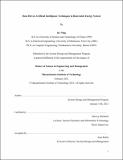Data driven artificial intelligence techniques in renewable energy system
Author(s)
Ning, Ke.
Download1263357737-MIT.pdf (3.818Mb)
Other Contributors
Massachusetts Institute of Technology. Engineering and Management Program.
System Design and Management Program.
Advisor
Harvey Michaels.
Terms of use
Metadata
Show full item recordAbstract
Today's power grid is composed of different kinds of distributed energy resources (DER) such as solar panels, wind farms, batteries and power transformers. DERs often come with data interfaces and IoT sensors which generate large amounts of data. Besides monitoring device status, those data can be utilized to improve system efficiency and generate additional values. My thesis is to examine the benefits of technologies that incorporate AI algorithms on the growing DER data in a technical perspective; First, a new field after IoT technology, called AIoT (Artificial Intelligence Internet of Things) is introduced, which are new technologies combining artificial intelligence (AI) and IoT to each other and creating new opportunities in the distributed energy resources (DER) field. Second, the thesis focuses on three areas of AIoT applications (1) fault prediction in photovoltaic system and power transformers; (2) remaining useful life (RUL) prediction of IoT enabled equipment; (3) AI-enabled algorithms can automate processes and make real time grid system optimization, such as energy storage, demand response (DR) and grid flexibility. The main focus is on data driven AI techniques that differentiate from traditional statistics or knowledge-based systems, present algorithm applicability, compare improvement over traditional method and business value created in each area. Finally, in the smart grid concept, all AIoT powered distributed energy resources (DER) can be aggregated in terms of virtual power plant (VPP), which enable the management of efficient and reliable power network on a large scale, and coordinate demand and supply in real-time. The AI enabled VPP architecture is presented, which utilized all the AIoT technologies and can provide valuable system capacity, flexibility and reliability.
Description
Thesis: S.M. in Engineering and Management, Massachusetts Institute of Technology, System Design and Management Program, February, 2021 Cataloged from the official version of thesis. Includes bibliographical references (pages 60-66).
Date issued
2021Department
Massachusetts Institute of Technology. Engineering and Management ProgramPublisher
Massachusetts Institute of Technology
Keywords
Engineering and Management Program., System Design and Management Program.